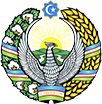

- Elektron kutubxona
- E-universitet
- Masofaviy ta'lim
- Mashg‘ulotlar jadvali
- Xorijiy talabalarga
- Stipendiya va grantlar
- Talabalarga xizmat ko'rsatish markazi
- Street Law
- Akademik mobillik
- Xorijiy professorlar
- Treninglar va mayner kurslar
- Klub va to‘garaklar, mahorat darslari va festivallar
- Murojat qilish
- Korruptsiyaga qarshi kurash usullari
- Ta’lim grantlari
- Toshkent davlat yuridik universitetida kiyinish tartibi
Talabalar uchun
Tashkent State University of Law STAKEHOLDER ENGAGEMENT POLICY
The Scientific Council of Tashkent State University of Law (hereafter “TSUL” or university) has the right to develop, evaluate and constantly review the Governance and Sustainability System, in particularly, to approve and update the university policies, which contain the guidelines governing the behavior of the TSUL and of the spinoffs belonging to the university.
The Purpose and Values of the following policy is to express the focus on the creation of shared sustainable value for the Stakeholders related to its activity and its institutional reality, in accordance with the commitments.
The TSUL is committed to involving all its Stakeholders and Companies in obtaining socialbenefits from its activities. The university participates in and leads, both from the economic viewpoint and from the perspective of business ethics, the promotion of diversity, equality, inclusion, the sense of belonging, and justice, and the encouragement of innovation and protection of the environment, ensures equal opportunity and non-discrimination in people management, as well as leadership in thefight against climate change.
In addition, appropriate governance by TSUL decisively contributes to the achievement of thepurpose of the Policy on Respect for Human Rights, commitment to the human rights recognised under domestic and international law and to define the general principles.
The COMPOSITION of the Council of Tashkent State Law University
1. PURPOSE
The purpose of this Policy is to establish the general framework for the TSUL’s relations with its Stakeholders and companies in all of its activities and operations, in order to:
(I) encourage Stakeholder participation in the University's activities through a strategy of actively participating in the communities in which it operates and creating shared sustainable value for all of them;
(II) meet the legitimate interests of the Stakeholders with whom TSUL interacts;
(III) building trust between stakeholders in order to build long-term, stable and lastingrelationships;
(IV) encourage the recognition by all Stakeholders of the TSUL’s commitment to diversity in the broad sense, especially in all matters relating to the professional development of their members;and
(V) contribute through all of the above to maintaining the reputation in the various countriesand businesses.
Notwithstanding the foregoing, the Scientific Council may approve other corporate policies addressing specific Stakeholders.
2. SCOPE OF APPLICATION
This Policy applies to all companies, as well as to all investees.
Without prejudice to the provisions of the preceding paragraph, listed country sub holdingcompanies and their subsidiaries, based on their own special framework of strengthened autonomy, may establish an equivalent policy, which must be in accord with the principles set forth in this Policy and in the other environmental, social and corporate governance and regulatory compliance policies of theGovernance and Sustainability System.
This Policy shall also apply, to the extent relevant, to the joint ventures, temporary joint venturesand other equivalent associations, if the Company assumes the management thereof.
3. THE STAKEHOLDERS
The value chain made up of the TSUL’s carried out activities means that its Stakeholders arequite numerous. Therefore, for purposes of this Policy, the Stakeholders are grouped into thefollowing categories:
• Workforce.
• Financial community.
• Regulatory entities.
• Customers.
• Suppliers.
• Media.
• Society as a whole.
These Stakeholders are in turn divided into other categories, the Sub- stakeholders, made up ofvarious groups and entities, which allows the management of the relationships to be adjusted to specificand local realities, needs and expectations, in many cases relating to the Group’s facilities.
4. BASIC PRINCIPLES
The University adopts and promotes the following basic principles of interaction and buildingtrust with its stakeholders:
A. Responsibility: act responsibly and build relationships based on ethics, honesty, sustainabledevelopment, and respect rights of individuals and the communities affected by the various activities.
B. Transparency: ensure transparency in relationships, and in financial and non-financialcommunications, sharing truthful, sufficient, relevant, complete, clear, reliable and useful information.
C. Active listening: practice active listening, encouraging bi-directional and effectivecommunication as well as direct, fluid, constructive, diverse, inclusive and intercultural dialogue.
D. Participation and engagement: encourage the participation and engagement of theStakeholders in all of the TSUL’s activities, promoting voluntary consultation processes or similar channels of interaction, and especially in the planning, construction, operation and decommissioningof the university projects.
E. Consensus: work towards consensus with the Stakeholders, especially with local communities and indigenous populations, taking their viewpoints and expectations into consideration.
F. Collaboration: promote collaboration with the Stakeholders, in order to contribute tocompliance with the Purpose and Values of the TSUL and the achievement of the SDGs.
G. Continuous improvement: seek continuous improvement, regularly reviewing Stakeholder engagement mechanisms to ensure that they respond in the most efficient way possible to the needs ofeach moment.
5. RESPONSIBILITIES IN THE MANAGEMENT OF STAKEHOLDERENGAGEMENT
The Scientific Council is empowered to approve and control the overall strategy on engagement with the TSUL’s Stakeholders, endeavoring to ensure the proper coordination thereof at the universitylevel.
Pursuant to the TSUL’s organizational structure, inspired by the principle of subsidiarity, thecountry subholding companies and the head of business companies, within their purviews, are responsible for implementing the strategy regarding Stakeholder engagement, as well as maintainingdirect discussion and dialogue with their various Stakeholders. For all the foregoing reasons, the country subholding companies and the head of business companies shall be endowed with the resourcesand structure necessary for them to carry out these activities.
6. GLOBAL STAKEHOLDER ENGAGEMENT MODEL
In 2017, the TSUL approved the Global Engagement Model based on the international standard,to comply with this Policy.
The Global Engagement Model, which is implemented to the TSUL using a shared digital application, contains the principles and provides the guidelines that, on the one hand, ensure that the TSUL’s Stakeholder engagement is homogeneous while respecting the particularities of each country and business, and on the other, establish the mechanisms required to ensure that the Stakeholdershave sufficient
Capacity to engage with the university. The main characteristics of the Global Engagement Model are the following:
A. It is a guide to stakeholder segmentation, identifying and prioritizing sub-stakeholdersbased on TSUL influence and ability to influence them.
B. It contains guidelines to ensure that stakeholders have sufficient ability to communicate with the university by regularly assessing the available channels and their characteristics (number, type and frequency of use) by those responsible for them.
C. It provides guidelines for identifying and prioritizing relevant issues (needs andexpectations) for each Stakeholder, and for identifying and managing the risks and opportunities associated with these important issues, all in relation to the TSUL's contribution to the achievement of the SDGs. In the case of risks, their management depends on their evaluation in terms of probability, impact and the existence of related reputational risks.
D. It contains the main guidelines to design and monitor action plans that respond to issuesthat are significant for the Stakeholders based on an assessment of the risks and opportunities thereof, while improving communication and relations therewith.
E. It allows you to know the impact of actions in relation to stakeholders, maximize positiveimpacts and mitigate negative ones.
F. It identifies future trends relating to the expectations of the Stakeholders, as well as goodpractices to be shared with the university.
Contact Information
If you have any questions, suggestions, or would like to get involved, please feel free to reach out to us:
Email: info@tsul.uz
Phone: +998 71 233-42-09
Office: 100047, Sayilgokh str. 35, Tashkent / UZBEKISTAN
Follow us on tsul.uz for regular updates and announcements.

